14 JUNE 2010
YOUR WORDS
Readers are invited to add their comments to any story. Click on the article to see and add.
BTN DISTRIBUTION
BTN also goes out by email every Sunday night at midnight (UK time). To view this edition click here.
- COMMENT: Can good come from the Iceland ash?
- BUSINESS TRAVEL MARKET
- 21st century 747 about to fly
- A380 gets a lifeline
- Africa and Delta
- Andaz expansion for Hyatt
- Axe the tax
- Baggage rules to be simplified
- Dubai Airports at the Aviation Club
- Emirates gets the honours
- Erbil (Iraq) gains another UK connection
- Fly Delta private jet
- Gatwick gets a Marriott
- New York return for Emirates A380
- Palma Mallorca and London
- Paris to London A380 service
- Passengers given flexile bookings
- Rio for TAM
- Schoenefeld has a name change
- Self-service baggage drop
- Stockholm - Bromma gets new flights
- Vietnam Airlines joins the club
- ON TOUR: The aviation leaders gather in Berlin
- MOTORING UPDATE by Ted Wilkinson
- HAPPY TALK: England to crash out!
The Business Travel News
PO Box 758
Edgware HA8 4QF
United Kingdom
info@btnews.co.uk
© 2022 Business Travel News Ltd.
21st century 747 about to fly
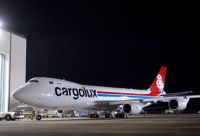 BOEING has revealed the first 747-8F in its complete paint scheme for launch customer Cargolux. The maiden flight is imminent. The Luxembourg-based cargo operator has a total of 13 Boeing 747-8 freighters on order with the first delivery by the end of the year. It is a sister aircraft to the new 747-8 Intercontinental, a stretched 18.3 ft development from the 747-400 providing 467 seats – 51 more than its predecessor – in a three-class configuration. The 747-8 incorporates many features from the 787 Dreamliner. Boeing has 108 orders for the 747-8 – 32 for the 747-8 Intercontinental and 76 for the 747-8 Freighter. The first 747-8 Intercontinental is scheduled to be delivered to Lufthansa in late 2011. www.boeing.com/commerical
BOEING has revealed the first 747-8F in its complete paint scheme for launch customer Cargolux. The maiden flight is imminent. The Luxembourg-based cargo operator has a total of 13 Boeing 747-8 freighters on order with the first delivery by the end of the year. It is a sister aircraft to the new 747-8 Intercontinental, a stretched 18.3 ft development from the 747-400 providing 467 seats – 51 more than its predecessor – in a three-class configuration. The 747-8 incorporates many features from the 787 Dreamliner. Boeing has 108 orders for the 747-8 – 32 for the 747-8 Intercontinental and 76 for the 747-8 Freighter. The first 747-8 Intercontinental is scheduled to be delivered to Lufthansa in late 2011. www.boeing.com/commerical
Andaz expansion for Hyatt
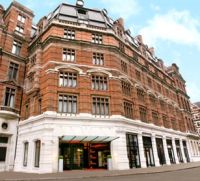 HYATT HOTELS CORPORATION has announced the signing of management agreements for three new Andaz upmarket properties. The hotels will be located in Sanya Sunny Bay (China); Delhi (India) and Providenciales (Turks and Caicos). These planned properties, situated in prime urban and resort locations, will be the latest additions to the expanding Andaz brand which, three years after its debut, includes 11 properties open or under development in six countries. Already established are Andaz hotels in London’s Liverpool Street (2007), West Hollywood (2009), Wall Street (2010) and Andaz San Diego (2010). Andaz 5th Avenue is scheduled to open in New York shortly. Projects under way include Austin, Texas; Amsterdam; and Papagayo (Costa Rica). www.hyatt.com
HYATT HOTELS CORPORATION has announced the signing of management agreements for three new Andaz upmarket properties. The hotels will be located in Sanya Sunny Bay (China); Delhi (India) and Providenciales (Turks and Caicos). These planned properties, situated in prime urban and resort locations, will be the latest additions to the expanding Andaz brand which, three years after its debut, includes 11 properties open or under development in six countries. Already established are Andaz hotels in London’s Liverpool Street (2007), West Hollywood (2009), Wall Street (2010) and Andaz San Diego (2010). Andaz 5th Avenue is scheduled to open in New York shortly. Projects under way include Austin, Texas; Amsterdam; and Papagayo (Costa Rica). www.hyatt.com
Dubai Airports at the Aviation Club
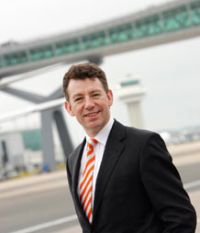 PAUL GRIFFITHS, CEO of Dubai Airports, was a very articulate and well received visitor to the London-based Aviation Club of the United Kingdom last week. Paul is well known in the UK following successful stints with Virgin Atlantic, where he was a member of the Executive Board, and as Managing Director of Gatwick Airport. Appointed to his present role in September 2007 his essential task is to oversee the opening of new Al Maktoum International Airport (DWC), due to start cargo operations later this month, and passenger services in late 2011. It is 25 miles south east of the existing Dubai Airport and has a Metro link under construction. Dubai moved 40m passengers in 2009 of which 65% were connecting. www.dubaiairport.com
PAUL GRIFFITHS, CEO of Dubai Airports, was a very articulate and well received visitor to the London-based Aviation Club of the United Kingdom last week. Paul is well known in the UK following successful stints with Virgin Atlantic, where he was a member of the Executive Board, and as Managing Director of Gatwick Airport. Appointed to his present role in September 2007 his essential task is to oversee the opening of new Al Maktoum International Airport (DWC), due to start cargo operations later this month, and passenger services in late 2011. It is 25 miles south east of the existing Dubai Airport and has a Metro link under construction. Dubai moved 40m passengers in 2009 of which 65% were connecting. www.dubaiairport.com
Fly Delta private jet
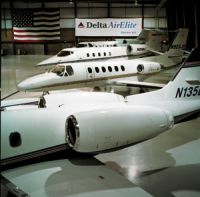 DELTA AIR LINES and its wholly-owned subsidiary, Delta AirElite, are introducing a service to allow customers to book scheduled commercial flights and on-demand private jet service in a single transaction using a pre-paid AirElite account. Through Delta AirElite, Delta is the only US airline offering customers combined access to commercial and private jet services. The airline was originally known as Comair Jet Express, and was rebranded in October 2001, by Comair parent airline, Delta. Earlier this year it doubled its fleet size to around 45 aircraft with the acquisition of Kinston, North Carolina-based Segrave Aviation. Whist it is possible to book a private jet for a regional flight from most major airports Lufthansa is the only other major carrier promoting such a service. www.airelite.com
DELTA AIR LINES and its wholly-owned subsidiary, Delta AirElite, are introducing a service to allow customers to book scheduled commercial flights and on-demand private jet service in a single transaction using a pre-paid AirElite account. Through Delta AirElite, Delta is the only US airline offering customers combined access to commercial and private jet services. The airline was originally known as Comair Jet Express, and was rebranded in October 2001, by Comair parent airline, Delta. Earlier this year it doubled its fleet size to around 45 aircraft with the acquisition of Kinston, North Carolina-based Segrave Aviation. Whist it is possible to book a private jet for a regional flight from most major airports Lufthansa is the only other major carrier promoting such a service. www.airelite.com
Palma Mallorca and London
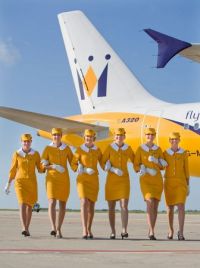 MONARCH AIRLINES is to take easyJet head on with the announcement of a brand new scheduled operation from Gatwick to Palma. The flights will operate three times per week (Tuesday, Thursday and Saturday) and sees the total number of flights by Monarch to the island rise to 23 per week, complementing the existing scheduled flights from Birmingham, Luton and Manchester airports. What makes Monarch different from some of its low cost competitors is that seats can be pre-booked at £7.50 per sector. From only £15, extra-legroom seats are available, which offer up to six inches of extra space. Hold baggage is charged (between £10/£15 per sector) and the hand baggage allowance is just 10kg. www.monarch.co.uk.
MONARCH AIRLINES is to take easyJet head on with the announcement of a brand new scheduled operation from Gatwick to Palma. The flights will operate three times per week (Tuesday, Thursday and Saturday) and sees the total number of flights by Monarch to the island rise to 23 per week, complementing the existing scheduled flights from Birmingham, Luton and Manchester airports. What makes Monarch different from some of its low cost competitors is that seats can be pre-booked at £7.50 per sector. From only £15, extra-legroom seats are available, which offer up to six inches of extra space. Hold baggage is charged (between £10/£15 per sector) and the hand baggage allowance is just 10kg. www.monarch.co.uk.
Rio for TAM
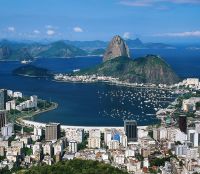 TAM BRAZILIAN AIRLINES is to introduce a three times per week service between Heathrow and Rio on 9 August, competing with British Airways on the route. The carrier will operate an Airbus A330-200 in a three-class configuration with a layout of four First Class, 36 Executive and 83 Economy. Flights both ways are overnight. TAM says that traffic to Rio over Sao Paulo is already strong and the new service will not only be quicker but will also free up capacity to its Sao Paulo hub. Rio is a centre city for the 2014 World Cup and will host the 2016 Olympic Games. www.tam.com.br
TAM BRAZILIAN AIRLINES is to introduce a three times per week service between Heathrow and Rio on 9 August, competing with British Airways on the route. The carrier will operate an Airbus A330-200 in a three-class configuration with a layout of four First Class, 36 Executive and 83 Economy. Flights both ways are overnight. TAM says that traffic to Rio over Sao Paulo is already strong and the new service will not only be quicker but will also free up capacity to its Sao Paulo hub. Rio is a centre city for the 2014 World Cup and will host the 2016 Olympic Games. www.tam.com.br
Stockholm - Bromma gets new flights
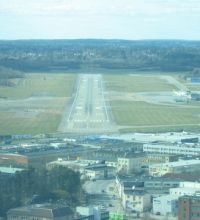 BROMMA AIRPORT, Stockholm's controversial downtown airport, has received a real boost with the news that, after nearly 50 years, Finnair is to return. The airport is just 5 miles from the city centre, and just like London City offers a 15-minute check-in. From 18 August the carrier will fly to Helsinki twice daily Monday to Friday with a single Sunday rotation. A 70-seat Embraer 170 will be used for the service. The airline will continue with its Helsinki – Stockholm Arlanda route, offering up to eight flights per day. www.brommaairport.com
BROMMA AIRPORT, Stockholm's controversial downtown airport, has received a real boost with the news that, after nearly 50 years, Finnair is to return. The airport is just 5 miles from the city centre, and just like London City offers a 15-minute check-in. From 18 August the carrier will fly to Helsinki twice daily Monday to Friday with a single Sunday rotation. A 70-seat Embraer 170 will be used for the service. The airline will continue with its Helsinki – Stockholm Arlanda route, offering up to eight flights per day. www.brommaairport.com
MOTORING UPDATE by Ted Wilkinson
The New Audi A8
Luxury with technology and driver appeal
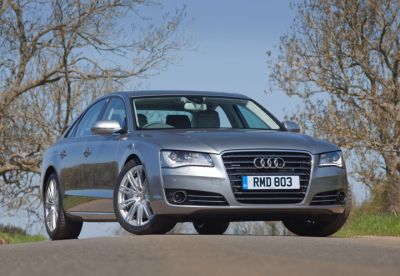 On the one hand there are drivers’ cars and on the other hand there are luxury cars. Rarely do these two requirements come together successfully in a single product, and even less often are they combined with fuel efficiency and lower environmental impact. Now there is the new Audi A8.
On the one hand there are drivers’ cars and on the other hand there are luxury cars. Rarely do these two requirements come together successfully in a single product, and even less often are they combined with fuel efficiency and lower environmental impact. Now there is the new Audi A8.
Audi’s technology flagship luxury saloon comes to the UK with highly developed 4.2-litre V8 engines in both petrol and diesel versions. Advanced use of aluminium in the ‘Audi Space Frame’ body construction combines light-weight with enhanced rigidity. Attached to this structure is a highly developed aluminium adaptive air suspension system that can be electronically adapted by the driver for comfort, sharp handling or any balance between the two.
Fuel and CO2 savings are enhanced by Audi’s recuperation technology that recycles some of the kinetic energy produced as heat under braking. This is stored as electrical energy and re-used to supplement engine power when acceleration is needed. Power from the engine goes through a new 8-speed tiptronic gearbox which can be used in fully automatic mode, or in manual, to suit the driver’s mood. All transmissions for 4.2-litre engines are Quattro 4-wheel drive and, available as standard in the TDI and as an option in the FSI petrol versions, is the active sport differential. This allows asymmetric distribution of power to the wheels. Under different driving conditions the balance of torque that is distributed to the front and rear wheels is varied to counter traction losses. When cornering, particularly under acceleration, more power is sent to the outer rear wheel which has the greater grip due to weight distribution. This literally pushes the car through the corner to maintain speed with safety.
The Audi drive-select adaptive dynamics system enables the driver to set up the car’s handling to suit personal preferences. The comfort setting is for long-distance cruising with light controls, smooth throttle response and relaxed engine revolutions. Switching to dynamic mode brings extra weight to the steering, sharper throttle response and later gear changes that allow the engine to spin more enthusiastically. Auto mode is a compromise between these two settings and will probably be used most of the time. A fourth setting allows the driver to adjust many aspects of the car’s dynamics to suit individual driving taste.
The Audi A8 is in a premium sector where buyers expect a very high level of quality and luxurious appointments. SE models have Valcona leather seating. Front seats have variable heating and electrically controlled lumbar support and full adjustment with memory. The media centre has music storage with programmable selection and external sources such as MP3 and USB can be connected. A satellite navigation system is provided and a centrally placed data screen displays mapping, trip and advanced route planning information. Bluetooth interface for mobile telephones is also standard. A clever feature is the touch-sensitive input pad. Whilst negotiating the many menus in the system, an initial letter can be written on the pad with one finger. If, for instance, the navigation system is being used, place names with that initial letter will be displayed. The selection can then be refined. This feature is also useful when choosing music.
The A8’s seats are very comfortable and both front and rear occupants have plenty of leg and head room. When no more than two passengers occupy the rear seats, a centre console can be folded down to provide an armrest, convenient support for drinks and small items and also a control panel for individual selection of heating. There is also a large selection of audio-visual equipment available on the options list. Other options include electronically programmed massaging built into the seat backs.
Whilst the SE versions of the Audi A8 are very well equipped, there is of course a very long list of options starting with the SE Executive versions which add extra safety and styling enhancements. Beyond that the list of available options is loo large to list here. Suffice it to say that it is very comprehensive indeed.
The A8 has a style all of its own yet is obviously an Audi. The constrained shape is conservative and does not shout about its luxury and abilities. The frontal treatment of the headlights and grill are perhaps the only slightly aggressive features of an otherwise understated presence. This is not a ‘show-off’ car and those who like to do so will no doubt look elsewhere. Some may say that the Audi lacks styling flare and is a bit boring; others will welcome its subtle expression of automotive taste. Audi’s sales success indicates that this category of car ownership is a large and ever growing one.
ON THE ROAD
The driver can adjust the seat and steering wheel using motorised controls to achieve a comfortable seating position. The array of buttons, instruments and screens appear a little daunting at first glance, but familiarity is soon achieved due to the logical thinking that has gone into the layout. The drive selector falls easily to hand and a press on the brake pedal and a push of the start button brings the engine to life. The only evidence of tickover is a movement of the tacho needle as there is little sound. This is particularly evident with the diesel engine which seems to be even more refined than the petrol version.
Once on the move the Audi picks up speed very rapidly, depending on road conditions, and proceeds in a quiet and refined manner. Motorway cruising is effortless with plenty of power to pick up speed where necessary. In both Auto and Comfort mode the gear changes are imperceptible. The steering is light yet has plenty of feel and the A8 corners with absolute stability. If the driver feels like a more involving experience the Dynamic mode can be selected. This brings sharper throttle response, firmer suspension, more weighted steering and later gear changes. The latter is more apparent in the petrol FSI version of the A8. With the throttle on the floor the engine spins up to 7000rpm before changing to the next gear and acceleration is, shall we say, brisk. There is also a satisfying sound from the exhaust during these changes, emphasising the sporting character of the marque.
With the A8 owners choose a relaxed or sporting drive, or anything in between, and can be assured the car will meet their requirements. The Audi A8 is a car for crossing continents in comfort one day and for plying city streets in equal comfort the next day. For those with exacting requirements that are looking for a luxury executive car, the Audi A8 should undoubtedly be on the short list of cars to consider.
Rivals include Jaguar XJ, Mercedes S Class, BMW 7 Series.
STAR RATINGS
Performance 10
Handling 10
Transmission 10
Brakes 10
Noise 10
Economy 9
Ride & comfort 9
Accommodation 9
Styling 8
Finish 10
Total 95
Audi A8 SE – recommended prices on-the-road:
4.2 FSI quattro £61,975
4.2 TDI quattro £63,900
As tested: £89,700 and £95,540
NOTES FROM TED WILKINSON'S MOTORING DIARY
CLONING: Over 1,300 cloned vehicles have been recovered in the UK since 2006. Car.Enquiry.co.uk which worked in co-operation with the AA in advising potential car buyers also reports that 100,000 DVLA documents, stolen in 2008 have not been recovered.
MAZDA: The Mazda 6 2.2 turbo diesel estate model has been voted the Best Estate Car 2010 by Fleet world magazine. The car is reported to have won by combining driver appeal with lifestyle, versatility and workhorse practicality. Mazda has also reported that it has appointed 20 additional dealers in the past year, bringing the UK network to its largest since 1969.
SEAT: The Spanish SEAT car maker has continued to develop its range of Ecomotive low running cost models, first seen on the Ibiza with versions of the Leon hatch back and the Altea compact MPV.
These two models combine high efficiency 1.6-litre TDI turbo diesel engines with Stop+Start technology and a Brake Engine Recovery system as has been used successfully on Grand Prix Cars. Additionally there are low rolling resistance tyres, improved aerodynamics, and a Diesel Particulate Filter.
Replacing the 1.9-litre turbo diesel engine, the smaller capacity power unit display high levels of refinement (as experienced during pre-launch testing), exceptionally low noise levels, impressive flexibility and with a power output (for both) of 105 bhp more than passable performance.
A serious gain are the very low exhaust emissions, the Leon returning 99g/km, the larger Altea 119 g/km allowing both to qualify for low road tax, currently at zero for the first year.
As to fuel consumption the Leon has a combined figure of 74.3 mpg providing a potential range of nearly 900 miles while the Altea’s Combined figure is equally attractive at 62.8 mpg.
Use of the Stop+Start system is hardly challenging, simply select neutral when at a halt and the engine will cut out, press the clutch and the engine cuts back in a smooth manner. The Brake Energy Recovery system ensures that constantly stopping and starting the engine does not drain the battery.
Leon Ecomotive is priced from £18,140, Altea Ecomotive from £18,725 - both on the road – and there is a an early buyer incentive of a £2,000 discount. A fleet order for 500 Leon Ecomotive models has been placed by Centrica.
SKODA: The Which? Magazine Award for the Best Car Manufacturer 2010 has been won by Skoda. The judging panel praised the Czech car maker for providing customers with more car for less cash.
TOYOTA: The British built Toyota Auris hybrid is due for UK sales launch on 1 July with prices starting from £18,950. Toyota report that the car will produce only 89g/km CO2 emissions, return up to 74.3 mpg on the Combined Cycle and be zero rated for VED.
COMMENT: Can good come from the Iceland ash?
Following the eruptions of the Eyjafjallajokull volcano on 14 April the politicians sprung into action. Never mind that the captain flies the aircraft and makes the decisions. Daily the professional pilot deals with hailstorms, icing, lightening, clear air disturbances and all the other potential problems of flying. Volcanic ash is no different.
But not according to the politicos. Here was an opportunity for the legislators to make a name for themselves. They backed up their dubious decisions by talking to their “experts” forgetting that the real experts were the airlines themselves.
Just to put the whole thing in perspective there are 500 active volcanoes around the world and 50 to 60 volcanic eruptions per year.
The Chileans and Indonesians are specialists at dealing with volcano problems on a very regular basis. Whilst the recent Chilean earthquake was a disaster in human terms, from a practical point of view the authorities co-ordinated and spoke with one voice. Flights were not lost and order was the way ahead, instead of chaos. Just one country and one leader, a military man, clearly helped.
With the Icelandic eruptions the results have been the complete opposite.
Or as IATA Director General and CEO Goivanni Bisignanai put it at the world airline gathering in Berlin last week, what happened was “mayhem”.
The cost has been enormous. And not just for Europe, but for many other parts of the world too. US$1.8bn revenue lost. 10m passengers stranded. Air cargo halted.
Who knows what the total price tag is? From an airline point of view alone you have to add the outlay in aircraft repositioning, extra crew night stops, and the work involved dealing with passenger refunds and cancellations. Notwithstanding EU rules regarding compensation, designed for human not natural disasters, the magnitude of losses by travellers will never be properly known.
But it could have been easily avoided.
In 1960, yes 1960, Eurocontrol was created for the express purpose of creating a single upper airspace by its six founding member states.
Over the last decade, air traffic has grown by more than 50%. Europe now has close to 8.5m flights per year and up to 28,000 movements on the busiest days. Eurocontrol membership now comprises of 38 countries.
Sadly progress has not been quick. In October 2001, the European Commission adopted proposals for a Single European Sky (SES), to create a community regulator for air traffic management within the EU plus Norway and Switzerland. There are discussions about enlarging the initiative to cover the Balkan and Mediterranean States.
The talk is to have nine air traffic advisory centres up and running by the end of 2012. Quite when SES would be operational is anybody’s guess.
Without a proper deadline the date will slip and slip.
Whilst the following is not a true comparison, it is at least topical.
South Africa was awarded the World Cup by FIFA in May 2004. The opening date was cast in stone. The target was met.
Likewise with SES. The European Single Sky must become an entity. It has been 50 years in the planning. A realistic target date must be set.
Which brings us back to the Eyjafjallajokull volcano.
Had SES been in operation the outpourings from Iceland would have been dealt with by a professional team of aviation experts, including aircrew, geologists and weathermen.
Yes it has been a disaster for the politicos and travellers too.
But out of bad can come good.
The politicos must learn the lesson. They have failed to implement SES. And they have diabolically failed when it comes to 14 April and its aftermath.
All needs putting aside now and working for the common good for the future of air transport in Europe, and the world. Eyjafjallajokul proved that we are truly in an aviation world.
MALCOLM GINSBERG
Editor in Chief
A380 gets a lifeline
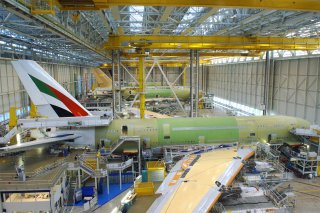 AIRBUS sprang a complete surprise on the opening day of the ILA Berlin Air Show at Schoenefeld last Tuesday with the announcement that Emirates had extended its 58 aircraft order for the Airbus A380 by an astonishing 32 more units. Airline President Tim Clark had sat through the previous day with his airline colleagues at the IATA gathering in central Berlin without saying a word. The new commitment takes the Emirates order book up to 143, all wide-bodies. Orders for the super jumbo had stalled over the last period and this commitment is considered a lifeline. www.airbus.com www.emirates.com
AIRBUS sprang a complete surprise on the opening day of the ILA Berlin Air Show at Schoenefeld last Tuesday with the announcement that Emirates had extended its 58 aircraft order for the Airbus A380 by an astonishing 32 more units. Airline President Tim Clark had sat through the previous day with his airline colleagues at the IATA gathering in central Berlin without saying a word. The new commitment takes the Emirates order book up to 143, all wide-bodies. Orders for the super jumbo had stalled over the last period and this commitment is considered a lifeline. www.airbus.com www.emirates.com
Axe the tax
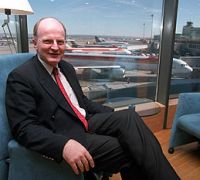 GERMANY'S completely unexpected government announcement of an airline tax, as reported elsewhere in AERBT, has brought an unprecedented response. Essentially the Federal authorities have said that they want to raise €1bn annually from the aviation industry by way of duty. No details appear to have been given and it is not known whether this is an arrivals tax, departures, and if connecting passengers have to pay. In Holland a similar imposition failed, common sense prevailing. "The most vulnerable part of the industry is in Europe. The last thing the industry here in Europe needs is additional taxes and measures that will slow down economic growth," IATA Chief Economist Brian Pearce told reporters. Commerzbank analyst Frank Skodzik said the burden for Lufthansa would be about €200m a year, assuming the carrier is able to pass on half of the tax to passengers. “The tax is supposed to help the environment by discouraging people from flying,” said AEA Secretary General Ulrich Schulte-Strathaus, “while at the same time pouring a billion Euros into the treasury. But if a passenger flies and pays the tax, he is impacting the environment. If he doesn’t fly, the treasury doesn’t get his money. A classic example of doublethink.” www.iata.org
GERMANY'S completely unexpected government announcement of an airline tax, as reported elsewhere in AERBT, has brought an unprecedented response. Essentially the Federal authorities have said that they want to raise €1bn annually from the aviation industry by way of duty. No details appear to have been given and it is not known whether this is an arrivals tax, departures, and if connecting passengers have to pay. In Holland a similar imposition failed, common sense prevailing. "The most vulnerable part of the industry is in Europe. The last thing the industry here in Europe needs is additional taxes and measures that will slow down economic growth," IATA Chief Economist Brian Pearce told reporters. Commerzbank analyst Frank Skodzik said the burden for Lufthansa would be about €200m a year, assuming the carrier is able to pass on half of the tax to passengers. “The tax is supposed to help the environment by discouraging people from flying,” said AEA Secretary General Ulrich Schulte-Strathaus, “while at the same time pouring a billion Euros into the treasury. But if a passenger flies and pays the tax, he is impacting the environment. If he doesn’t fly, the treasury doesn’t get his money. A classic example of doublethink.” www.iata.org
Emirates gets the honours
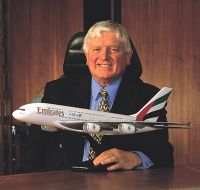 SIR MAURICE FLANAGAN is the new title of the creator of the Emirates Group, and currently the Executive Vice-Chairman, announced in the Queen’s birthday honours list. Now 82 and, after many years in the Gulf, still very much a Lancastrian, he might have played football for Blackburn Rovers (whom he still supports), but a knee injury put paid to a possible career. Maurice spent 25 years with BOAC and British Airways before he was asked by the Dubai government in1985 to create a locally based airline. Today Emirates operates to 108 destinations in 60 countries from its hub in Dubai, and currently has a fleet of 140 aircraft, a number which is expected to double over the next decade. www.emirates.com
SIR MAURICE FLANAGAN is the new title of the creator of the Emirates Group, and currently the Executive Vice-Chairman, announced in the Queen’s birthday honours list. Now 82 and, after many years in the Gulf, still very much a Lancastrian, he might have played football for Blackburn Rovers (whom he still supports), but a knee injury put paid to a possible career. Maurice spent 25 years with BOAC and British Airways before he was asked by the Dubai government in1985 to create a locally based airline. Today Emirates operates to 108 destinations in 60 countries from its hub in Dubai, and currently has a fleet of 140 aircraft, a number which is expected to double over the next decade. www.emirates.com
Gatwick gets a Marriott
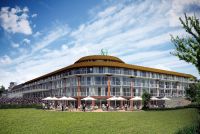 MARRIOTT has opened the Lingfield Park Marriott Hotel & Country Club in Surrey. It is seven miles, or 12 minutes’ drive from Gatwick Airport but in layout and setting it is a world away. The 116-room room property adjoins the Lingfield Park race course, the first in the UK with an all-weather track. The 450-acre hotel site, in rolling countryside, features an 18-hole golf course. The Breathe Spa features amenities for health and relaxation including a sparkling indoor swimming pool, steam room, sauna and fitness centre. Marriott International’s Hotel & Country Club Collection in the UK currently consists of ten properties, including the prestigious St Pierre Marriott Hotel & Country Club (Bristol), the Dalmahoy Marriott Hotel & Country Club (Edinburgh) and the Hanbury Manor Marriott Hotel & Country Club (Ware – north of London). www.marriott.com
MARRIOTT has opened the Lingfield Park Marriott Hotel & Country Club in Surrey. It is seven miles, or 12 minutes’ drive from Gatwick Airport but in layout and setting it is a world away. The 116-room room property adjoins the Lingfield Park race course, the first in the UK with an all-weather track. The 450-acre hotel site, in rolling countryside, features an 18-hole golf course. The Breathe Spa features amenities for health and relaxation including a sparkling indoor swimming pool, steam room, sauna and fitness centre. Marriott International’s Hotel & Country Club Collection in the UK currently consists of ten properties, including the prestigious St Pierre Marriott Hotel & Country Club (Bristol), the Dalmahoy Marriott Hotel & Country Club (Edinburgh) and the Hanbury Manor Marriott Hotel & Country Club (Ware – north of London). www.marriott.com
Paris to London A380 service
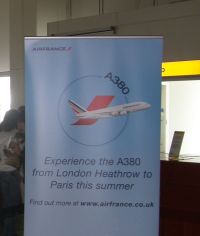 AIR FRANCE has introduced the Airbus A380 on weekend services between Charles de Gaulle and Heathrow. Announced less than one month ago the flights have attracted unprecedented interest according to UK and Ireland General Manager Henri Hourcade. “During the first five days we took over 6,000 bookings for the £80 fully inclusive promotional return fare, which is terrific going. We are not even up and running with our marketing campaign yet!” M Hourcade said that May from the UK had been very good with the load factor up fours points from last year. “This may be due to BA’s problems,” he said. The inaugural flight last Saturday was full in Economy, with a few seats available in Business Class. The majority of passengers seemed to have specially booked to be on the A380. The single return flight from Paris operates Friday to Monday until the beginning of September. www.airfrance.com
AIR FRANCE has introduced the Airbus A380 on weekend services between Charles de Gaulle and Heathrow. Announced less than one month ago the flights have attracted unprecedented interest according to UK and Ireland General Manager Henri Hourcade. “During the first five days we took over 6,000 bookings for the £80 fully inclusive promotional return fare, which is terrific going. We are not even up and running with our marketing campaign yet!” M Hourcade said that May from the UK had been very good with the load factor up fours points from last year. “This may be due to BA’s problems,” he said. The inaugural flight last Saturday was full in Economy, with a few seats available in Business Class. The majority of passengers seemed to have specially booked to be on the A380. The single return flight from Paris operates Friday to Monday until the beginning of September. www.airfrance.com
Schoenefeld has a name change
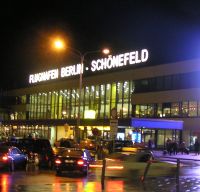 BERLIN SCHOENEFELD INTERNATIONAL AIRPORT, now officially named “Berlin Brandenburg Willy Brandt" and given the three letter code BER, is set to open on 30 October 2011 with the change to the winter timetable. The airport will replace the already closed historical Tempelhof, and also Tegel, the existing international airport and in post war times a French military operation, whose last commercial flight is the day before. Willy Brandt is a €2.5bn redevelopment of the existing previously East German Schoenefeld Airport. Included is a second runway, much improved road and train connections, and a state of the art terminal. SXF (Schoenefeld) already has easyJet, German Wings and Ryanair as tenants. www.berlin-airport.de
BERLIN SCHOENEFELD INTERNATIONAL AIRPORT, now officially named “Berlin Brandenburg Willy Brandt" and given the three letter code BER, is set to open on 30 October 2011 with the change to the winter timetable. The airport will replace the already closed historical Tempelhof, and also Tegel, the existing international airport and in post war times a French military operation, whose last commercial flight is the day before. Willy Brandt is a €2.5bn redevelopment of the existing previously East German Schoenefeld Airport. Included is a second runway, much improved road and train connections, and a state of the art terminal. SXF (Schoenefeld) already has easyJet, German Wings and Ryanair as tenants. www.berlin-airport.de
Vietnam Airlines joins the club
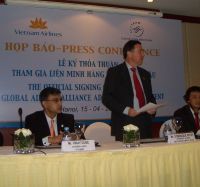 SKYTEAM has welcomed Vietnam Airlines as its first member in Southeast Asia. Throwing off its background as a one time French colony, and the location of a nasty civil war, Vietnam has made vast progress in recent times. The importance of the formal acceptance occasion was marked by the attendance of Prime Minister Nguyen Tan Dung and Leo van Wijk, Chairman of the SkyTeam Governing Board. The airline flies to 20 destinations domestically, and to another 28 internationally. Its current fleet of 64 aircraft includes 30 Airbus A320 series, nine Airbus A330s and ten Boeing 777-200ERs. ATR 72 aircraft are used for domestic services and on order are 16 Boeing 777s. The airline is state-run with plans for privatisation. www.vietnamairlines.com
SKYTEAM has welcomed Vietnam Airlines as its first member in Southeast Asia. Throwing off its background as a one time French colony, and the location of a nasty civil war, Vietnam has made vast progress in recent times. The importance of the formal acceptance occasion was marked by the attendance of Prime Minister Nguyen Tan Dung and Leo van Wijk, Chairman of the SkyTeam Governing Board. The airline flies to 20 destinations domestically, and to another 28 internationally. Its current fleet of 64 aircraft includes 30 Airbus A320 series, nine Airbus A330s and ten Boeing 777-200ERs. ATR 72 aircraft are used for domestic services and on order are 16 Boeing 777s. The airline is state-run with plans for privatisation. www.vietnamairlines.com
HAPPY TALK: England to crash out!
Car insurance companies in the UK will be pleased if England crash out of the World Cup in the early stages.
Based on information collated from the 2006 tournament it appears that England's drivers crash their cars more often on England match days. In 2006 incidents leapt by some 14% generally during the whole tournament. Accident figures when England played against Portugal and lost on penalties rose by over 51%.
There are no reported figures for Scotland!
BUSINESS TRAVEL MARKET
This year’s Business Travel Market (BTM) takes place on Wednesday and Thursday (16 and 17 June) at ExCeL, East London. It is set to be much bigger with more on offer to visitors than last year’s successful inaugural experience.
Event Director Paul Robin said: “There are 170 companies for visitors to meet on over 100 stands as well as an exceptionally high quality free education programme with 90 speakers across 20 sessions. We are very proud of what we have achieved.”
It does look like he is right. BTM has attracted some of the biggest names in the industry to speak, including a keynote address from the current man in the spotlight, Willie Walsh, as well as other impressive panellists from air travel, the hospitality industry, business travel solutions specialists and travel management companies (TMCs).
Walsh is expected to focus on the post-recession landscape for business travel buyers and suppliers when he addresses delegates on Thursday afternoon.
The free conference programme is a major draw for visitors to the show which will include an anticipated 400 hosted buyers, who are coming from across Europe for the two-day event.
Key industry bodies ITM (Institute of Travel Management), ACTE (Association of Corporate Travel Executives and HBAA (Hotel Booking Agents Association) have this year shown their full support of the event, working with BTM’s advisory board to shape the conference programme. Highlights of the sessions include: ‘NextGen Interaction’ – a chance to discuss changing communication and meeting methods; ‘Emerging Markets’ – an opportunity to learn more about the way business is carried out in Brazil, China, Gulf States and India; ‘There’s More to a Travel Programme Than Air & Hotels’ and ‘A Paler Shade of Green’ – focusing on the post-Copenhagen landscape and considering whether the pressures on being green are still as high on the corporate agenda.
Following on IATA (and various references in this week’s AERBT) it is particularly apt that BTM has confirmed that one of its conference sessions will be discussing the most recent air travel crisis. ‘Does the Ash Cloud have a Silver Lining?’ asking a panel of experts from BA, BARUK, BBC, FCm and Qatar Airways – could it have been dealt with better, what lessons have been learnt and how will it be handled when it happens again?
From the world of hotels, Taj will be announcing the reopening of three properties: the Taj Mahal Palace in Mumbai on 1 July, the Taj Falaknuma Palace, Hyderabad, in November and the 115-room Pera Palace Hotel in Istanbul which reopens on 1 September after a two-year €23m restoration.
The Wyndham Hotel Group will be available to discuss their recent announcement regarding the transfer of the Tryp hotel brand from Sol Meliá Hotels & Resorts, and the Oberoi group can talk to business travellers about their new facilities at the recently re-opened Oberoi Mumbai. The Pestana hotels group have also got big news to share, with their first foray into the UK market with the four-star Pestana Chelsea Bridge Hotel and Spa in South West London.
It’s not just the big name hotels making developments in our capital city – SACO, the worldwide serviced apartment network, will be using BTM to announce a new serviced apartment opening this summer on Fleet Street in London, a fantastic central location to be based while doing business in the UK.
There is something about South America this year at Business Travel Market – perhaps it’s the fact that London and Rio de Janeiro are the next two hosts of the summer Olympic Games, but Brazil-based airline TAM will be announcing details and discussing with visitors the new non-stop service it will introduce on 9 August between London and Rio de Janeiro. Also off to Brazil and Argentina is key exhibition sponsor Qatar Airways.
Transport solutions providers also have a big presence at the event with Director Paul Quigley of Meridian Global Services available on their stand to speak to delegates about the implication of the EU VAT package for the travel industry in 2011. It will affect the taxation of services related to conferences, meetings and events.
FCm Travel Solutions will be launching a new loyalty programme at BTM – designed specifically for travel bookers. FCm Advantage is an interactive web-based programme that provides individual rewards to travel bookers, who often include personal assistants and secretaries. Reward points are earned for each booking made with FCm and can translate into movie passes, electronic goods and even holidays.
Register for BTM now at www.businesstravelmarket.co.uk or sign up on the day. 10:00 on 16 and 17 June at ExCeL, London.
Africa and Delta
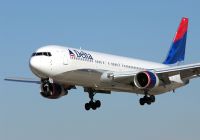 MONROVIA, capital of Liberia, is the latest destination in Africa for Delta Air Lines. A three times per week service from Atlanta begins on 4 September. The direct flight is routed via Accra (Ghana). The service will be operated by a 215-seat Boeing 767-300ER aircraft, equipped with 34 BusinessElite seats and 181 in Economy. This summer, Delta will operate flights to seven African destinations. In addition to Monrovia, Delta will offer services to Abuja (Nigeria), Accra (Ghana), Cairo (Egypt), Dakar (Senegal), Johannesburg (South Africa) and Lagos (Nigeria). Delta also intends to serve Luanda (Angola), Malabo (Equatorial Guinea) and Nairobi (Kenya) once government approvals are received. Until Delta’s entry into Africa in December 2006, no major US carrier had flown to sub-Saharan Africa since Pan Am in the late 1980s. Delta currently remains the only major American carrier to operate services between Africa and the US. www.delta.com
MONROVIA, capital of Liberia, is the latest destination in Africa for Delta Air Lines. A three times per week service from Atlanta begins on 4 September. The direct flight is routed via Accra (Ghana). The service will be operated by a 215-seat Boeing 767-300ER aircraft, equipped with 34 BusinessElite seats and 181 in Economy. This summer, Delta will operate flights to seven African destinations. In addition to Monrovia, Delta will offer services to Abuja (Nigeria), Accra (Ghana), Cairo (Egypt), Dakar (Senegal), Johannesburg (South Africa) and Lagos (Nigeria). Delta also intends to serve Luanda (Angola), Malabo (Equatorial Guinea) and Nairobi (Kenya) once government approvals are received. Until Delta’s entry into Africa in December 2006, no major US carrier had flown to sub-Saharan Africa since Pan Am in the late 1980s. Delta currently remains the only major American carrier to operate services between Africa and the US. www.delta.com
Baggage rules to be simplified
 IATA announced ACBR (Automated Carrier Baggage Rules), a project in its “simplifying the Business programme” during the annual airline gathering in Berlin. The whole concept is to provide a central database for interline baggage rules, enabling airlines, travel agents, and passengers to know what baggage rules will apply for any given itinerary. “Airlines have a variety of different rules and fees depending on the number of bags checked, class of travel, frequent flyer status and routings. ACBR will put all of that information in one place so passengers can have a complete understanding of baggage fees before they buy their tickets – even for complicated journeys,” said Aleks Popovitch Senior Vice President Industry Distribution and Financial Services. IATA is partnering with the Airline Tariff Publishing Company (ATPCO), who will host the central database. The plan is for all airlines to submit their baggage rules to ATPCO by September 2010 for implementation in early 2011. www.iata.com
IATA announced ACBR (Automated Carrier Baggage Rules), a project in its “simplifying the Business programme” during the annual airline gathering in Berlin. The whole concept is to provide a central database for interline baggage rules, enabling airlines, travel agents, and passengers to know what baggage rules will apply for any given itinerary. “Airlines have a variety of different rules and fees depending on the number of bags checked, class of travel, frequent flyer status and routings. ACBR will put all of that information in one place so passengers can have a complete understanding of baggage fees before they buy their tickets – even for complicated journeys,” said Aleks Popovitch Senior Vice President Industry Distribution and Financial Services. IATA is partnering with the Airline Tariff Publishing Company (ATPCO), who will host the central database. The plan is for all airlines to submit their baggage rules to ATPCO by September 2010 for implementation in early 2011. www.iata.com
Erbil (Iraq) gains another UK connection
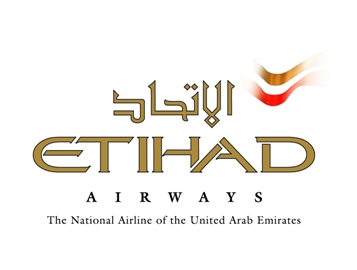 ETIHAD AIRWAYS has launched non-stop flights from its home base in Abu Dhabi to Erbil, becoming the first UAE carrier to operate to northern Iraq. Etihad will initially offer two return services per week with two-class Airbus A320 aircraft. The commencement of Etihad's services to Erbil follows the successful launch of the airline's flights to Baghdad in April this year, which quickly grew from three services per week to a daily service. With an 08:30 departure, and the return flight arriving at 15:10 the service connects up well with the overnight flights into Abu Dhabi from Europe. www.etihadairways.com
ETIHAD AIRWAYS has launched non-stop flights from its home base in Abu Dhabi to Erbil, becoming the first UAE carrier to operate to northern Iraq. Etihad will initially offer two return services per week with two-class Airbus A320 aircraft. The commencement of Etihad's services to Erbil follows the successful launch of the airline's flights to Baghdad in April this year, which quickly grew from three services per week to a daily service. With an 08:30 departure, and the return flight arriving at 15:10 the service connects up well with the overnight flights into Abu Dhabi from Europe. www.etihadairways.com
New York return for Emirates A380
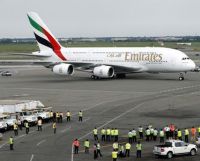 EMIRATES is to have another attempt to make the A380 superjumbo work on one of its double daily Dubai – New York JFK services when the aircraft replaces a Boeing 777 from 1 October. New York was launched with a crescendo as the airline’s maiden A380 route in August 2008. Last June, with the economic downturn, the twice daily service was withdrawn in favour of a pair of Boeing 777s, the aircraft transferred to the Dubai – Toronto and Dubai – Bangkok routes. Emirates believe that by the Fall conditions will be right for its latest A380 delivery to be used on this service. Emirates currently operates ten A380 aircraft, serving Auckland, Bangkok, Jeddah, London (LHR), Paris, Seoul, Sydney and Toronto. In March 2010, the airline announced the start of A380 services to Beijing from 1 August and Manchester 1 September. www.emirates.com
EMIRATES is to have another attempt to make the A380 superjumbo work on one of its double daily Dubai – New York JFK services when the aircraft replaces a Boeing 777 from 1 October. New York was launched with a crescendo as the airline’s maiden A380 route in August 2008. Last June, with the economic downturn, the twice daily service was withdrawn in favour of a pair of Boeing 777s, the aircraft transferred to the Dubai – Toronto and Dubai – Bangkok routes. Emirates believe that by the Fall conditions will be right for its latest A380 delivery to be used on this service. Emirates currently operates ten A380 aircraft, serving Auckland, Bangkok, Jeddah, London (LHR), Paris, Seoul, Sydney and Toronto. In March 2010, the airline announced the start of A380 services to Beijing from 1 August and Manchester 1 September. www.emirates.com
Passengers given flexile bookings
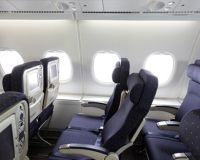 AIR FRANCE passengers travelling in Voyageur (Economy) Class can now take advantage of flexible travel with the airline’s new "Time to Think” e-service. Operating on all European routes, the online function enables Air France customers to hold a reservation and fare for up to 14 days. Those deciding to purchase their ticket will automatically receive their boarding pass 30 hours prior to departure. If customers decide not to confirm the reservation, it will be cancelled when the “Time to Think” period expires. Starting at £10 per passenger, the new e-service is set to benefit both business customers who may be unsure of their travel dates and passengers wanting to take advantage of a fare sale but are not ready to confirm a booking. www.airfrance.com
AIR FRANCE passengers travelling in Voyageur (Economy) Class can now take advantage of flexible travel with the airline’s new "Time to Think” e-service. Operating on all European routes, the online function enables Air France customers to hold a reservation and fare for up to 14 days. Those deciding to purchase their ticket will automatically receive their boarding pass 30 hours prior to departure. If customers decide not to confirm the reservation, it will be cancelled when the “Time to Think” period expires. Starting at £10 per passenger, the new e-service is set to benefit both business customers who may be unsure of their travel dates and passengers wanting to take advantage of a fare sale but are not ready to confirm a booking. www.airfrance.com
Self-service baggage drop
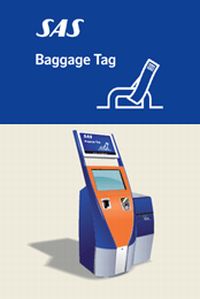 SAS is rolling out a fully automated baggage drop following a trial instigated in Norway last summer. It is planned to be in operation at Stockholm’s Arlanda Airport domestic terminal by September. The service has been developed and launched in corporation with the airport providers Avinor in Norway and Swedavia in Sweden. The fully automated system is equipped with SAS biometric technology and does not require any manning. It recognizes what baggage allowance each passenger is entitled to, for example: if the customer is travelling on a Business Class ticket, or is a EuroBonus Gold or Silver card holder, the system automatically adjusts the baggage allowance. Swipe your boarding card or phone. www.sas.com
SAS is rolling out a fully automated baggage drop following a trial instigated in Norway last summer. It is planned to be in operation at Stockholm’s Arlanda Airport domestic terminal by September. The service has been developed and launched in corporation with the airport providers Avinor in Norway and Swedavia in Sweden. The fully automated system is equipped with SAS biometric technology and does not require any manning. It recognizes what baggage allowance each passenger is entitled to, for example: if the customer is travelling on a Business Class ticket, or is a EuroBonus Gold or Silver card holder, the system automatically adjusts the baggage allowance. Swipe your boarding card or phone. www.sas.com
ON TOUR: The aviation leaders gather in Berlin
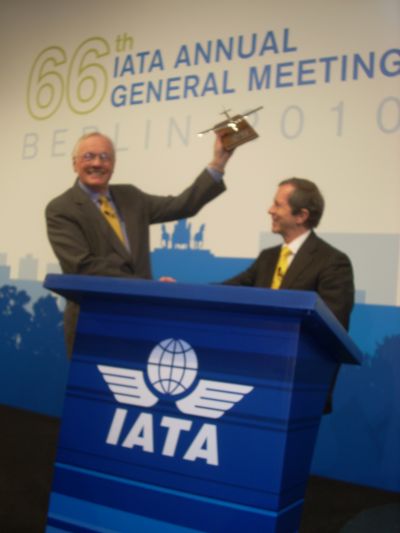 The presence of one individual dominated the annual gathering of world air transport leaders in Berlin last week at IATA, a surprise appearance of Neil Armstrong, the first man on the moon, and not so much a recluse, but in an era dominated by the personality cult, an essentially private man. He received the highest honour that IATA can bestow, its rarely offered Global Leadership award.
The presence of one individual dominated the annual gathering of world air transport leaders in Berlin last week at IATA, a surprise appearance of Neil Armstrong, the first man on the moon, and not so much a recluse, but in an era dominated by the personality cult, an essentially private man. He received the highest honour that IATA can bestow, its rarely offered Global Leadership award.
In his short but fascinating acceptance speech Armstrong (80 later this year) noted that in space one can circle the globe in 85 minutes. It has not always been that way. The first round the world flight was by a team of US Army aviators in 1924, which eventually took 175 days. The maiden commercial service was by BOAC, hosted on a Bristol Britannia in March 1959.
IATA is a busy gathering
The modern IATA gatherings are packed into 48 hours, always what we now call a “networking” occasion, where the leaders of the world’s civil aviation community intermingle with their contemporaries, with the suppliers to the industry, and with the press. For the most part it is relaxed and even Willie Walsh, under immense pressure, able to have a quiet beer late in the evening, and talk about other things.
Whilst Armstrong was the star turn of the proceedings Giovanni Bisignani, the outgoing IATA Director General and CEO (he announced his June 2011 retirement during the event) was the ringmeister. He dominating the whole proceedings, a bundle of energy, rushing from meeting to presentation, but never too busy to stop and shake you by your hand even if not sure who you were.
Vision 2050
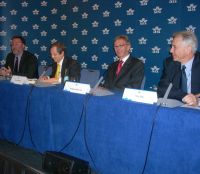 “The questions about our future are endless. And we will not find the answers in isolation,” said Bisignani launching Vision 2050 – Shaping Aviation’s Future. Vision 2050 is a ground breaking initiative to lay the foundations for a sustainable and profitable industry by looking ahead strategically with a four-decade time frame.
“The questions about our future are endless. And we will not find the answers in isolation,” said Bisignani launching Vision 2050 – Shaping Aviation’s Future. Vision 2050 is a ground breaking initiative to lay the foundations for a sustainable and profitable industry by looking ahead strategically with a four-decade time frame.
The launch of Vision 2050 comes in the wake of six days without aviation in large parts of the European continent as a result of the ash plume from an Icelandic volcano. “April gave us a vivid picture of life without aviation. Ten million people were stranded. Hotels and convention centres were empty. Seafood and flowers rotted. And just-in-time production was delayed.”
“It reminded us that without air connectivity, modern life is not possible,” said Bisignani. “We must seize the moment to bring governments and partners on board in building our future. Together we will build a resilient industry based on our four cornerstones of change. We will protect ourselves from cycles and shock with sustainable profitability. We will exceed our customers’ expectations. And we will be an industry that is even safer, greener, and more successful,” he said opening the proceedings on Monday morning.
Even before the formal opening the Intercontinental Hotel was busy, the evening before Boeing hosting their traditional reception, the delightful event let down a little by awful acoustics. AERBT believes that there were two speakers including at least one from Seattle but what they said was lost in the throng. What was learnt, after a couple of glasses of Riesling, was that number three 787 prototype was scheduled for Farnborough, complete with a passenger interior.
oneworld
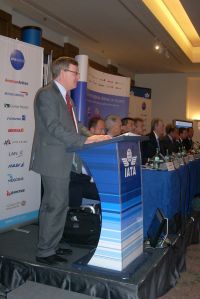 As has now become something of a tradition the proceedings were kicked off (the World Cup was probably number one on the informal discussion list) by oneworld with a 07:45 media briefing attended by virtually all the individual airline Chief Executives with the main purpose to formerly accept India’s Kingfisher Airlines into the 12-carrier club.
As has now become something of a tradition the proceedings were kicked off (the World Cup was probably number one on the informal discussion list) by oneworld with a 07:45 media briefing attended by virtually all the individual airline Chief Executives with the main purpose to formerly accept India’s Kingfisher Airlines into the 12-carrier club.
Russia’s leading domestic airline S7 is on track to join oneworld later this year.
With the formal proceedings over Willie Walsh. British Airways’ chief (and sponsor of Kingfisher), did a manful job in standing up to what was really a press maul by friends (rather than the sometimes over reacting London media). oneworld was forgotten. Journalists like to make the best of opportunities. Nothing was really learnt except his resolution to stand firm.
The Chief Executive Forum
From the BBC’s World Service Nik Gowing, he himself a regular air traveller, hosted a lively debate with again BA’s Walsh out regarding his airline labour views, this time from the floor. "We have rewarded trade unions for doing the wrong things and haven't been brave enough in the past to stand up and say no," he said on being pressed by Gowing. “During the current stage of the BA cabin crew strike we are flying 80% of our long haul schedules. We're going to hold out for as long as it takes. We cannot ignore the inefficiencies we see in our industry."
Another speaker from the large audience, and in the front row, was Qatar Airways CEO Akbar Al Baker, claiming not to be controversial. "There will be two dominant carriers in the Gulf region,” he said. "You can guess which ones!”
Emirates boss Tim Clark refused to comment (and at this point the massive Emirates A380 order was still top secret), whilst Etihad Airways CEO James Hogan, absent elsewhere in the building, was quick to return, the point made that Abu Dhabi does not have debt problems. Royal Jordanian Chairman and CEO Hussein Dabbas is of the view that if consolidation is to happen it will be in the same vein as Air France-KLM, British Airways-Iberia, and Lufthansa-Swiss. The national identities of the carrier will be retained.”
Tempelhof
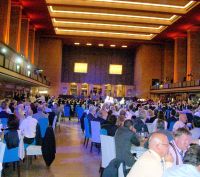 The Monday night dinner for the 600 airline and industry guests, and over 200 press, was hosted by Airbus in the terminal concourse of Berlin’s former Tempelhof Airport. On a balmy evening we all stood under the massive apron canopy as co-host Lufthansa made a flypast with their Junkers 52. Once again the speeches were less than audible, but the splendid fashion parade by LH cabin staff made up for everything. From 1926 to 2010. Nostalgic to A380.
The Monday night dinner for the 600 airline and industry guests, and over 200 press, was hosted by Airbus in the terminal concourse of Berlin’s former Tempelhof Airport. On a balmy evening we all stood under the massive apron canopy as co-host Lufthansa made a flypast with their Junkers 52. Once again the speeches were less than audible, but the splendid fashion parade by LH cabin staff made up for everything. From 1926 to 2010. Nostalgic to A380.
Tuesday
Delegates assembled, some bleary eyed, on the Tuesday morning as IATA reacted sharply to the announcement made by the German government of a €1bn annual burden on air travel with a new departure tax. It is branded as an environmental initiative.
Bisignani was enraged and said so to a press conference originally convened to summarize the whole IATA gathering. Lufthansa’s Wolfgang Mayrhuber looked aghast. “This is the worst kind of short-sighted policy irresponsibility. It’s a cash-grab by a cash-strapped government. Painting it green adds insult to injury. There will be no environmental benefit from the economic damage caused,” said Bisignani.
And then it was straight into a session entitled “Government and Industry partnership” hosted by popular Australian BBC World business presenter Aeron Heslehurst, a regular at these events.
The good news, the way the Chilean authorities dealt with their volcano disaster, and the bad news, with particular reference to the British response, were dealt with, the elegant General Jose Hueppe Perez, Minister of Aviation, explaining Santiago’s reaction, compared with Europe and both Pierre-Henri Gourgon, CEO of Air France, and Joachim Hunold, his counterpart at Air Berlin, critical of the authorities. Indonesia has a volcano problem too but once again the airlines are allowed to deal with the matter themselves rather than deal with government interference said Emisyah Satar, President and CEO of the reinvigorated Garuda Indonesia. He also somehow managed to mention the airline’s new route into Amsterdam via Dubai.
Finally it was on to the final media session with once again the tireless Mr Bisignani leading from the front.
He announced Cairo for the 2011 event, and whether he is there as the leader, or mere spectator remains to be seen. Head hunters have been authorised. The diminutive Italian will be a hard act to follow!


